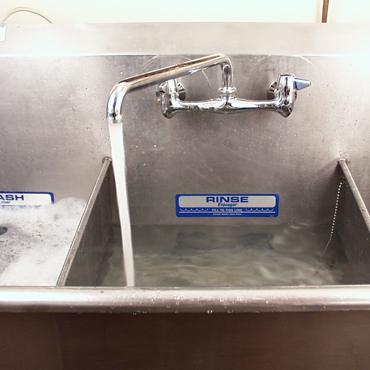Water Conditions in the Warewashing Environment
When it comes to selecting the proper dish machine chemicals, water conditions play a major role in which chemicals will be appropriate for a particular account. Water hardness, bicarbonate alkalinity, TDS, silica, and chlorides are all impurities that can be found in a water supply which can add additional challenges to getting dishes clean and spot free. The two main water impurities that must first be taken into consideration when selecting dish machine chemicals are water hardness and bicarbonate alkalinity. Water hardness is a combination of calcium and magnesium and is found in almost all untreated water. Water hardness becomes an issue inside of the dish machine because when it is exposed to heat or alkalinity it will try to leave the water and attach itself to anything it can, including dishes. This can make it difficult to remove food soils and cause white chalky spotting on the dishes. The extent of this problem will be determined by how much water hardness is in the water. Water that has a hardness of 0-4 grains per gallon is considered soft, 4-7 slightly soft, 7-12 hard, and 12 and above very hard. Each one of our dish machine detergents and rinse additives have a water hardness tolerance in which they will perform best in. Water conditioners are added to our products to block water harnesses from attaching to dishes. The more water conditioners that are added to a product the higher water hardness tolerance that product will have. Keep in mind that our products have to be dosed at the recommended amount for them to perform within their water tolerance range.
As mentioned before bicarbonate alkalinity is another common water impurity that needs to be taken into consideration when selecting products. Unlike water hardness which affects what detergent and rinse can be used, bicarbonate alkalinity only affects which rinse products are appropriate for a particular account. Any account with bicarbonate alkalinity over 200 ppm will need what is called a high-solids rinse additive to combat this impurity. Untreated bicarbonate alkalinity will mainly affect glassware and silverware. Residual bicarbonate alkalinity will leave what is called “ghosting” on dishes causing light white streaks on the dishes. Many times this will be confused with residual dish machine detergent. Water softeners do not remove bicarbonate alkalinity so the best way to treat it is with the proper rinse additive.
Before selecting products for an account, make sure to do a water hardness test and bicarbonate alkalinity test. This will narrow down which products can be considered and make obtaining good results much easier. For water tolerances of specific products contact the U S Chemical Training Department or speak with your U S Chemical Field Support Representative. There are other factors you will need to take into consideration when selecting products, but matching up products based on water hardness and bicarbonate alkalinity is the first step to obtaining good results. Any additional water testing that may be needed can be done by sending in a water sample to the U S Chemical Training Department.
Please click the link to view our Warewash Total Test Kit Video.

